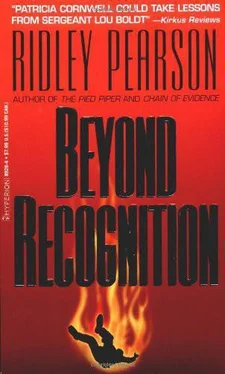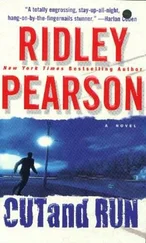Ridley Pearson - Beyond Recognition
Здесь есть возможность читать онлайн «Ridley Pearson - Beyond Recognition» весь текст электронной книги совершенно бесплатно (целиком полную версию без сокращений). В некоторых случаях можно слушать аудио, скачать через торрент в формате fb2 и присутствует краткое содержание. Жанр: Триллер, на английском языке. Описание произведения, (предисловие) а так же отзывы посетителей доступны на портале библиотеки ЛибКат.
- Название:Beyond Recognition
- Автор:
- Жанр:
- Год:неизвестен
- ISBN:нет данных
- Рейтинг книги:5 / 5. Голосов: 1
-
Избранное:Добавить в избранное
- Отзывы:
-
Ваша оценка:
- 100
- 1
- 2
- 3
- 4
- 5
Beyond Recognition: краткое содержание, описание и аннотация
Предлагаем к чтению аннотацию, описание, краткое содержание или предисловие (зависит от того, что написал сам автор книги «Beyond Recognition»). Если вы не нашли необходимую информацию о книге — напишите в комментариях, мы постараемся отыскать её.
Beyond Recognition — читать онлайн бесплатно полную книгу (весь текст) целиком
Ниже представлен текст книги, разбитый по страницам. Система сохранения места последней прочитанной страницы, позволяет с удобством читать онлайн бесплатно книгу «Beyond Recognition», без необходимости каждый раз заново искать на чём Вы остановились. Поставьте закладку, и сможете в любой момент перейти на страницу, на которой закончили чтение.
Интервал:
Закладка:
The bright flash and subsequent roar was seen and heard over twenty-five miles away as the core fire reached over four hundred feet into the air and the resulting column of smoke over ten times that.
Boldt leaned on his pickax, his head angled toward the fire, his eyes on the driver of that pickup truck. Stay and watch it , Boldt encouraged the man silently. Get out of the truck and watch . The burning building was a block and a half away from traffic, but firemen were deliberately allowing pedestrians a closer look, having roped off a spot only half a block away from the event. Of the seven people standing there watching, all were from law enforcement.
Get out of the truck , Boldt encouraged for a second time, the dispatcher’s voice listing Garman’s location in that inhuman monotone. Daphne had been convinced that a spectacular fire would lure him out of his vehicle. “He can’t resist a fire,” she had said. Boldt was taking that to the bank, right or wrong.
As part of the ruse, one of the four cars preceding Garman pulled over and the driver climbed out and hurried toward the fire for a better look. Lead by example , Boldt thought. But to the sergeant’s horror, Garman did not get out, electing to watch from the front seat of the truck. Worse, some cars farther behind launched into a protest chorus of honking. The driver of the Chevy was nursed back, away from the truck, but wasn’t liking the manhandling.
The truck’s wheels crept forward, as if Garman was to drive on.
Out of the truck! Boldt begged. He could feel the man drawn to the fire, but-concerned over his cargo and the job at hand, Martinelli-he seemed reluctant to stay and watch. Boldt pleaded silently for him to stay. The fire roared loudly as the first hose was trained onto it. Firemen, bearing hose, charged the structure.
Jonny Garman pulled his truck over to the shoulder. Traffic moved around the minor accident in the road and drivers rubbernecked as they passed the blaze. Boldt reached into the pocket of the coveralls and felt the grip of the gun’s stock. He locked eyes with LaMoia and then across the street with the officer closest to Garman, a woman dressed as a street person.
As the truck’s cab door came open, Boldt’s world crawled into slow motion. His elation surfaced as a clarity of thought, vision, and hearing. Garman appeared to be as much interested in the firemen as the fire itself. Perhaps it had to do with memories of his father; perhaps it would never be explained.
One leg dangled out of the cab, followed by the other-he was getting out! Garman slipped down onto the pavement and, still holding the door, spun his head forward and back, assessing his situation. Worried about the parking? Boldt wondered. Feeling the presence of something wrong, something misplaced, something staged? The suspect pushed the cab door shut and walked toward the front of his truck, toward a better view of the burn and the action.
The street woman, near the back of the truck, took several long strides to close the distance, her hand slipping into her torn shopping bag. LaMoia, carrying his shovel-a worker fascinated by the fire-ran past Boldt, as if going for a better look.
Garman took no notice of any of them. His neck craned back and his head lifted up in that eerie slow motion, and he drank in the power of the fire. The magnificence. He stepped several feet in front of, and away from, the truck, just far enough to pick him.
In Boldt’s ear, the drone of radio communication sounded slowed down as well, the words impossible to discern. The sergeant’s hand gripped the pistol. The investigation came down to that moment: a truck loaded with volatile fuel and a disturbed, disfigured man just out of reach.
Garman, his synthetic face filled with a childish glee as he drank in the fire, rocked his head back and forth in joy, spraying rainwater off his sweatshirt like a dog shaking, glancing around him, attempting to share the thrill of that moment with others. The fire erupted into a shower of flame, spark, and ash, and Boldt thought he saw the suspect’s body convulse; his awkward mouth seemed shaped into the curve of a laugh.
Garman’s excited eyes swept briefly over the scene behind him, where, in a failed attempt to convince the driver of the Chevy to retreat, the undercover cop had resorted to dragging and shoving the bystander to the ground, anticipating a fire fight. In the process, the man’s coat flew open and his gun, holster, and harness showed.
Garman’s elation collapsed. Realization stung him. His eyes registered each of the fifteen people immediately in his vicinity, and he seemed to acknowledge that each and every one was law enforcement personnel. He was trapped. He identified LaMoia, and then the street woman, and backed up two steps toward the truck and the fuel it contained.
LaMoia changed direction too quickly, slipped, and fell. The street woman was blocked by the truck itself.
Boldt and his fellow construction worker, the closest officers to Garman, launched themselves in the direction of the suspect. Over the radio a sharpshooter announced a line-of-sight shot. Shoswitz’s voice gave the order to take him.
The shot went straight through his shoulder and sprayed blood onto the truck, but Garman never felt it. He swung open the truck door, which absorbed the sniper’s next two attempts, and jumped in behind the wheel.
Boldt’s slow-motion world continued-all action, all sound misplaced.
The pickup truck lurched ahead, smashing into the car parked in front of it. LaMoia was back on his feet, and Garman looked just quickly enough to see him. Boldt was three strides from the truck, as Garman cut the wheel and, rather than turn into traffic, rather than face LaMoia, jumped the sidewalk. The driver’s side window blew out behind the power of another sniper attempt. Boldt jumped for the truck, his toes catching the running board, his right hand losing hold of his gun as he clawed to hold on.
Garman shoved down the accelerator.
The pickup’s back tires squealed over the curb, and Garman drove through the weedy vacant lot toward the street ahead and that raging fire.
Boldt did not know nor did he think that the fuel in the truck was enough to consume over three city blocks; he knew only that Miles and Sarah needed a father, now more than ever, and that their father was riding a pickup truck toward Hell.
Whether Garman was attempting an escape or a suicide didn’t matter, because the present course of the truck predetermined the destination.
The driver aimed his blank white face at the sergeant, brown eyes recessed behind sculpted plastic skin. For that instant, something exchanged between them, something sparked. Boldt reached for the gear shift, but Garman struck him hard. The sergeant shoved himself deeper into the window, pushing the driver across the seat. He reached for balance, and his arm pushed through and stuck inside the steering wheel, making it impossible to turn the wheel. They bounced through the lot, and Boldt’s head struck the ceiling and the pickup altered its course just far enough to crash into one of the pumpers. It was like hitting a brick wall. They careened off to the right, heading once again for the burning building, and thumped over the swollen fire hoses. Boldt felt his arm snap. His head swam with the pain, and for an instant he slipped toward unconsciousness. He couldn’t catch his breath.
They were headed straight for the missing front door of the burning building-straight for Hell.
I don’t belong here, Boldt thought. It’s not my time.
Garman clawed at Boldt’s face, trying to drive him back out the window. His foot found the accelerator and the truck surged forward.
Overcoming the pain, Boldt heaved his broken arm farther through the wheel, his fingers fishing for the key. Garman’s attention was fixed on the white bucket on the floor. It registered in Boldt that this bucket would have been the one to use in window washing; Garman’s rocket fuel was inside it. The driver craned forward to reach for it, but Boldt grabbed the sweatshirt hood, pulled hard, and held him up short.
Читать дальшеИнтервал:
Закладка:
Похожие книги на «Beyond Recognition»
Представляем Вашему вниманию похожие книги на «Beyond Recognition» списком для выбора. Мы отобрали схожую по названию и смыслу литературу в надежде предоставить читателям больше вариантов отыскать новые, интересные, ещё непрочитанные произведения.
Обсуждение, отзывы о книге «Beyond Recognition» и просто собственные мнения читателей. Оставьте ваши комментарии, напишите, что Вы думаете о произведении, его смысле или главных героях. Укажите что конкретно понравилось, а что нет, и почему Вы так считаете.












